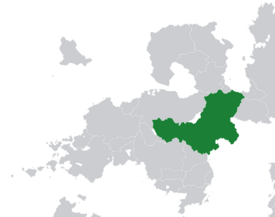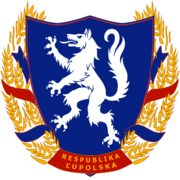People's Republic of Luepola
This article is incomplete because it is pending further input from participants, or it is a work-in-progress by one author. Please comment on this article's talk page to share your input, comments and questions. Note: To contribute to this article, you may need to seek help from the author(s) of this page. |
People's Republic of Luepola Respublika Narodna Ľupolska | |||||||||||
|---|---|---|---|---|---|---|---|---|---|---|---|
| 1905-1948 | |||||||||||
|
Flag | |||||||||||
| Motto: Proletari svah stran, se-sújeđinújte! Workers of all countries, unite! | |||||||||||
| Anthem: Piesăň Priške Song of the Prishekers | |||||||||||
| Capital | Prishek | ||||||||||
| Official languages | Luepolan | ||||||||||
| Common languages | |||||||||||
| Government | Federal semi-presidential republic (1901-1906) Federal Flecquist one-party socialist republic (1906-1948) | ||||||||||
| Chairman of the Communist Party | |||||||||||
• 1905-1916 | Lev Gincburg (first) | ||||||||||
• 1916-1936 | Stanislav Kolar | ||||||||||
• 1936–1948 | Anton Marusić | ||||||||||
• 1948 | Saňin Mlakar (last) | ||||||||||
| Legislature | Sliet | ||||||||||
| National Assembly Narodni Sbor | |||||||||||
| Popular Assembly Ľudovi Sbor | |||||||||||
| Historical era | Late modern period | ||||||||||
• Election of Lev Gincburg as President (Formation) | 4 December 1905 | ||||||||||
• Treaty of Adtrus (Dissolution) | 24 July 1948 | ||||||||||
| Population | |||||||||||
• 1905 | 53,711,386 | ||||||||||
• 1948 | 58,815,073 | ||||||||||
| Currency | Luepolan Grivna (Ғ) | ||||||||||
| |||||||||||
The People's Republic of Luepola (Luepolan: Respublika Narodna Ľupolska) was a socialist state in eastern Patyria, and the world's first internationally recognized socialist state. It officially regarded itself as a direct continuation of the First Republic of Luepola, only distinguished by the transition to Flecquist ideals, but it is widely considered to be a separate entity from the First Republic; the date of the election of Lev Gincburg to the Luepolan presidency is treated as the beginning of a separate period of Luepolan history by academia. It was dissolved immediately after its surrender to the Allied powers at the end of the Great War, beginning a period of direct military rule by the Vierz Reichswehr. During its existence, it maintained the colonial network of the First Republic of Luepola through the use of nominally independent Peoples' Republics which continued to operate as a de facto colonial empire controlled by the Communist Party of Luepola.


